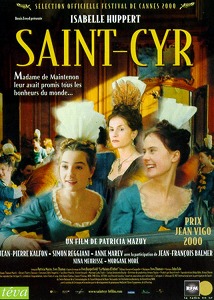| Revision as of 12:41, 27 December 2024 editSimbine0 (talk | contribs)48 editsmNo edit summaryTag: Reverted← Previous edit | Latest revision as of 14:05, 29 December 2024 edit undoWaxworker (talk | contribs)Extended confirmed users125,331 edits Undid revision 1265926862 by 81.185.165.122 (talk) see WP:CATVERTag: Undo | ||
| (4 intermediate revisions by 4 users not shown) | |||
| Line 81: | Line 81: | ||
| ] | ] | ||
| ] | ] | ||
| ] | |||
Latest revision as of 14:05, 29 December 2024
2000 French film by Patricia Mazuy This article is about the film. For the 17th-century immigrants to New France, see King's Daughters.
| The King's Daughters | |
|---|---|
 Film poster Film poster | |
| Directed by | Patricia Mazuy |
| Written by | Patricia Mazuy Yves Dangerfield Yves Thomas |
| Produced by | Helga Bähr Diana Elbaum Denis Freyd |
| Starring | Isabelle Huppert |
| Cinematography | Thomas Mauch |
| Edited by | Ludo Troch |
| Music by | John Cale |
| Production companies | Archipel 35 Lichtblick FilmProduktion Entre Chien et Loup Arte France Cinéma France 2 Cinéma WDR FMB Films ACCAAN Les Films du Camélia Cinéart |
| Distributed by | Universal Pictures (through United International Pictures) |
| Release date |
|
| Running time | 119 minutes |
| Countries | France Belgium Germany |
| Language | French |
The King's Daughters (French: Saint-Cyr) is a 2000 period drama film directed by Patricia Mazuy. It was screened in the Un Certain Regard section at the 2000 Cannes Film Festival. It was adapted from the novel La maison d’Esther by Yves Dangerfield.
Plot
In March 1685, Louis XIV’s final wife Madame de Maintenon wishes to set up a boarding school for young daughters of noble families that have fallen on hard times, the Maison royale de Saint-Louis, a school where girls receive a pious but liberal education. The first difficulty is that the students from the provinces all speak different regional languages and dialects and the first task is to teach them all to speak a standardised Parisian French.
After a few years of indifference, the school’s first aims prove impossible to attain. An important crisis arises from a performance by the students of an extract from Iphigenie by Racine. This provokes too much passion among the actors and so Madame de Maintenon asks Racine to write her a play for her students that praises virtue – this proves to be Esther. The students put on the new play and, when the king and his court attend the production, Madame de Maintenon realises that this had made the nobles of the court view her protégées as targets for seduction and marriage. Marriage proposals mount up and one nobleman even manages to break into the school.
Madame de Maintenon decides to impose stricter rules and plunges into religion in an attempt to expiate her past. She asks an abbot to help her keep students on the right Christian moral path and keep them safe from the world. Instead of turning its students into an elite for the world outside, the school falls prey to realities, cuts itself off from reality and falls apart – the film ends with its final failure and closure.
Cast
- Isabelle Huppert as Madame de Maintenon
- Jean-Pierre Kalfon as Louis XIV
- Simon Reggiani as The Abbot
- Jean-François Balmer as Racine
- Anne Marev as Madame de Brinon
- Ingrid Heiderscheidt as Sylvine de la Maisonfort
- Nina Meurisse as Lucie de Fontenelle
- Morgane Moré as Anne de Grandcamp
- Bernard Waver as Gobelin
- Jérémie Renier as François de Réans
- Jeanne Le Bigot as Lucie (child)
- Mathilde Lechasles as Anne (child)
- Alain Hinard as First soldier
Soundtrack
The film's score was composed by Welsh composer and former member of the Velvet Underground, John Cale. The score was arranged by Randy Wolf, and released as a soundtrack album.
See also
References
- "The King's Daughters". 17 May 2000. Retrieved 29 September 2016 – via IMDb.
- "The King's Daughter (2000)". UniFrance. Retrieved 8 August 2021.
- "Festival de Cannes: The King's Daughters". festival-cannes.com. Retrieved 16 October 2009.
- John Cale - Saint-Cyr (Bande Originale Du Film), retrieved 13 August 2022
External links
| Films directed by Patricia Mazuy | |
|---|---|
|
- 2000 films
- French historical drama films
- 2000s historical drama films
- Films directed by Patricia Mazuy
- Films scored by John Cale
- Films set in 1685
- Films set in the 1690s
- Films based on French novels
- Films set in boarding schools
- 2000 drama films
- 2000s French films
- Belgian historical drama films
- German historical drama films
- 2000s Belgian films
- 2000s German films
- French-language Belgian films
- French-language German films
- Arte France Cinéma films
- France 2 Cinéma films
- Universal Pictures films
- United International Pictures films